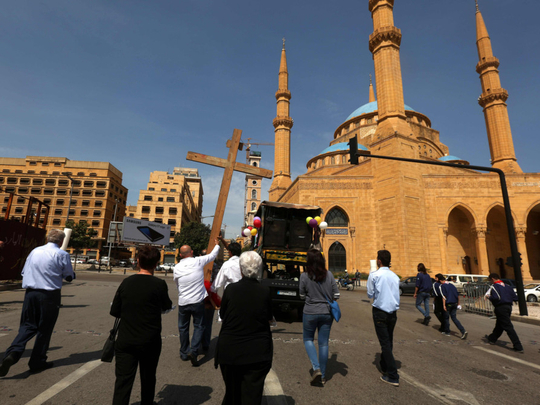
Beirut: In the latest annual Pew Research Center survey, titled “The Divide Over Islam and National Laws in the Muslim World,” pollsters sought views as to whether the Quran should influence laws in 10 countries with significant Muslim populations, including Lebanon, where surprising results reflected the country’s unique socio-political configuration.
While the poll found that half or more of respondents in four countries — Pakistan, the Occupied Palestinian territories, Jordan and Malaysia — said laws should strictly follow Sharia, small percentages in Burkina Faso, Turkey and Lebanon wished to see their legal systems altered.
In fact, only 15 per cent of Lebanese Muslims — estimated to make up 55 per cent of the entire population — preferred that the legal system strictly follow Sharia. Another 37 per cent of Lebanese Muslims believed that the legal system should include Sharia precepts but not follow them strictly, while 42 per cent were opposed to any such considerations.
A majority of Lebanese Christians (59 per cent) stated that Sharia should not influence the country’s laws. But while that was probably expected, the more interesting data was the significant difference between Lebanese Sunnis — who are divided between supporters (34 per cent) and challengers (37 per cent) — and Lebanese Shiites (56 per cent backers).
Yet, even in those instances where Lebanese Shiites said laws should follow Islamic principles, most insisted that Sharia should not be applied too strictly. Sunnis preferred that laws simply “reflect” Islamic values (34 per cent), which highlighted the influences of co-existence with Lebanese Christians.
Unlike Pakistan or even Jordan, where calls for stringent application of Sharia were common, 75 per cent of Lebanese Muslims accepted that laws should not fall under such interpretations, which reflected the country’s diverse ethnic and religious make-up even if the Lebanese, both Muslim as well as Christian, are faithful to their respective religions and seldom shy from displaying religiosity in public.
Equally important in the Pew survey was the percentage (50 per cent) of young Lebanese (18-29 year-olds) who said that laws should not be influenced by Sharia, compared with 36 per cent among those 50 and older.
Elsewhere in the ten countries surveyed, the majority supported moderate interpretations, even if dramatic changes were noted in the Palestinian territories — where backing to stricter rules nearly doubled from 36 per cent in 2011 to 65 per cent in 2015 — and Nigeria (where it went from 21 to 27 per cent). It stayed the same in Pakistan (78 per cent) in the two benchmark years of 2011 and 2015.
There were also some declines as in Jordan, which recorded an 18-point drop between 2012 and 2015, even if those who preferred strict interpretations stood at 54 per cent.
Nevertheless, the survey underscored once again that an increasing number of Arabs and Muslims were keenly aware of Sharia legal precepts and preferred them to be revised. Nigeria and Indonesia, with very large Muslim populations, opted for values and principles rather than extremism.
Even overwhelmingly Muslim Turkey, currently led by an Islamist leader, voted for secularism with only 13 per cent wishing to see strict Sharia laws applied.
Inasmuch as these variations reflected higher levels of secondary school education, along with a country’s history and religious composition, Lebanon stood as a model of co-existence even if it experienced largely confused socio-political disputes. While Lebanese Muslims, like their Christian brethren, are devout believers, what the 2015 Pew survey underscored was the critical transformation among Sunnis, often mistakenly accused of supporting extremist elements like Daesh, the so-called Islamic State. The critical revelation in this latest survey was the growing gap within the Lebanese Shiite community.












